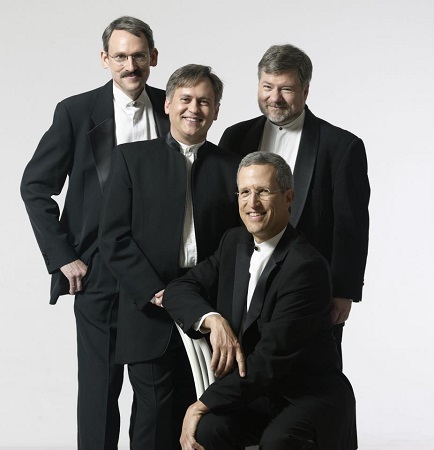 United States Schubert: Orion String Quartet, Peter Wiley (cello), Benjamin Franklin Hall, American Philosophical Society, Philadelphia, 17.2.2019. (BJ)
United States Schubert: Orion String Quartet, Peter Wiley (cello), Benjamin Franklin Hall, American Philosophical Society, Philadelphia, 17.2.2019. (BJ)

Schubert – String Quartet No.15 in G major, D.887; String Quintet in C major, D.956
The combination of Schubert’s last two — and arguably greatest — chamber works makes so obvious and natural a program that I can scarcely believe I have never encountered it before. With players as fine as the Philadelphia Chamber Music Society put on stage for these performances, the rewards for listeners are as profound as any concert might be expected to offer, nor did the reality fall any more than fractionally below expectations.
If I find myself compelled to note one or two such fractional disappointments, they were confined essentially to certain details in the performance of the first of the two works. Not that violinists Daniel and Todd Phillips, violist Steven Tenenbom, and cellist Timothy Eddy treated us in the G-major Quartet to playing of anything less than the utmost refinement, expressive intensity, and technical polish.
The first movement breathed all the mystery inherent in this astonishingly complex score, and the scherzo, thrillingly, went like the wind. In the Adagio, however, the Orions took their meticulous care for detail perhaps a trifle too far: Timothy Eddy’s cello tone is a superb combination of radiance and sonorous depth, but the balance of texture did not allow his eloquent playing of the searingly plangent main theme to shine through as vividly as it might have done. And in the headlong finale the consistent failure to mark the fz accent on the fourth note of the main theme deprived the B-flat of its contrast with the B-natural that almost instantly follows. This negated the theme’s function in summarizing the work’s overarching concentration on the vibrant interplay between major and minor modes: the structural significance and ambivalent harmonic character of the movement were thereby sacrificed in the simpler interest of mere speed.
With the C-major Quintet after intermission there were no such problems: this was a performance of total mastery. It may sound like a truism, but there is a vital difference between notes that are not really out of tune and notes that hit the exact middle of the pitch. Partnered now by a distinguished second cellist in Peter Wiley, whose authoritative bow arm is matched by the wide range of nuance he commands in pizzicato, the Orion Quartet’s playing was a triumphant demonstration that, if you play every note precisely in the middle of the pitch, the music will sound good.
My only cavil was again the omission of the first movement’s exposition repeat, which is more damaging here than in the G-major Quartet, because it results in our first encounter with the little staccato three-note figure just before the end of the exposition being followed too soon by its return a mere three measures into the development section, thus slightly distorting the form of the movement. But everything else about the Quintet performance was wonderful. Tempos were well judged, tone and articulation were impeccable, expression was rich but never eccentric, and in the sublime slow movement an early-music-like tamping down of vibrato, combined with the pinpoint accuracy of intonation I have spoken of, created a hypnotic sense of stillness that tugged at the heartstrings.
Bernard Jacobson